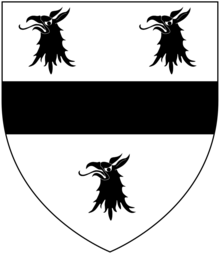
William Smyth was Bishop of Coventry and Lichfield from 1493 to 1496 and then Bishop of Lincoln until his death. He held political offices, the most important being Lord President of the Council of Wales and the Marches. He became very wealthy and was a benefactor of a number of institutions. He was a co-founder of Brasenose College, Oxford and endowed a grammar school in the village of his birth in Lancashire.
Colebrooke is a village and parish in Devon, England about 8 km west of Crediton. The main point of interest is the church and the connection to Henry Kingsley's novel The Recollections of Geoffry Hamlyn. Also Uncle Tom Cobley, of the folk song, signed his will at Pascoe House, but is buried 4 miles west at Spreyton. The champion Devon wrestler, Abraham Cann was born and buried here. He won the all-comers wrestling crown in London.
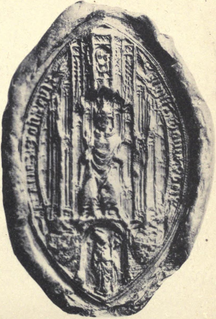
Thomas de Brantingham was an English clergyman who served as Lord Treasurer to Edward III and on two occasions to Richard II, and as bishop of Exeter from 1370 until his death. De Brantingham was a member of the Brantingham family of North East England.
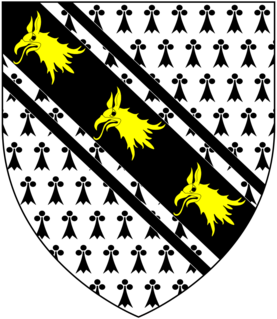
Walter Yonge (1579–1649) of Great House in the parish of Colyton in Devon, England, was a lawyer, merchant and diarist.
Devon was a parliamentary constituency covering the county of Devon in England. It was represented by two Knights of the Shire, in the House of Commons of England until 1707, then of the House of Commons of Great Britain from 1707 to 1800 and finally the House of Commons of the United Kingdom from 1801 to 1832. Elections were held using the bloc vote system of elections.

John Booth was a 15th-century English prelate who held numerous appointments in the church and royal service.

Sir Jonathan Trelawny, 2nd Baronet, of Trelawny in the parish of Pelynt in Cornwall, England, was a Member of Parliament.

Brigadier-General Henry Trelawny was a British Army officer of Cornish descent, a Member of Parliament and Vice-Admiral of Cornwall.

Efford is an historic manor formerly in the parish of Eggbuckland, Devon, England. Today it has been absorbed by large, mostly post-World War II, eastern suburb of the city of Plymouth. It stands on high ground above the Laira estuary of the River Plym and provides views over long distances: to the north across Dartmoor, to the east and south-east across the South Hams. It consists predominantly of local authority and housing association properties. Before this land was built upon it was known as 'The Wilds of Efford', and was largely unspoilt countryside and marsh land. That a deer park may have been attached to the manor is suggested by the survival of the street name "Deer Park Drive".
Sir Richard Reynell, of Pitney in the county of Somerset, Sheriff of Devon in 1191-4, was a knight who lived during the successive reigns of Kings Henry II (1154-1189), Richard I (1189-1199) and John (1199-1216).

Sir Richard Edgcumbe of Cotehele in the parish of Calstock in Cornwall, was an English courtier and Member of Parliament.

Nicholas Duck, of Heavitree and of nearby Mount Radford in the parish of St Leonards, both next to Exeter in Devonshire, was an English lawyer who served twice as a Member of Parliament for Exeter, in 1624 and 1625. He was one of the Worthies of Devon of the biographer John Prince (1643–1723), whose wife was his great-niece.

Sir Hugh Courtenayof Boconnoc, Cornwall, was MP for Cornwall in 1446-47 and 1449-50. He was beheaded after the Battle of Tewkesbury in 1471.
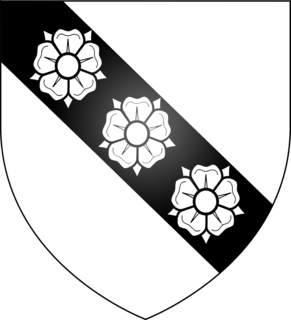
Sir John Cary, of Devon, was a judge who rose to the position of Chief Baron of the Exchequer (1386–88) and served twice as Member of Parliament for Devon, on both occasions together with his brother Sir William Cary, in 1363/4 and 1368/9.

Milton Abbot is a village, parish, and former manor in Devon, 6 miles (9.7 km) north-west of Tavistock, Devon, and 6 miles (9.7 km) south-east of Launceston, Cornwall.

Sherford is a village and former civil parish and manor, now in the parish of Frogmore and Sherford, in Devon, situated about 2 1/2 miles east of the town of Kingsbridge. It should not be confused with the new town Sherford to be built on the outskirts of Plymouth, about 18 miles to the north-west. The parish church is dedicated to Saint Martin of Tours. In 1961 the parish had a population of 258. The parish was abolished in 1986 and merged with parts of South Pool and Charleton to form "Frogmore and Sherford".
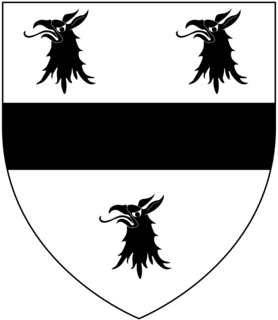
Kenedon is an historic manor situated in the parish of Sherford in Devon.

Walter Reynell was a Member of Parliament for Devon in 1404.

Walter Reynell of Malston in the parish of Sherford, Devon, was a Member of Parliament for Devon in 1454/5.

John Reynell was a Member of Parliament for Devon in 1427/28.
